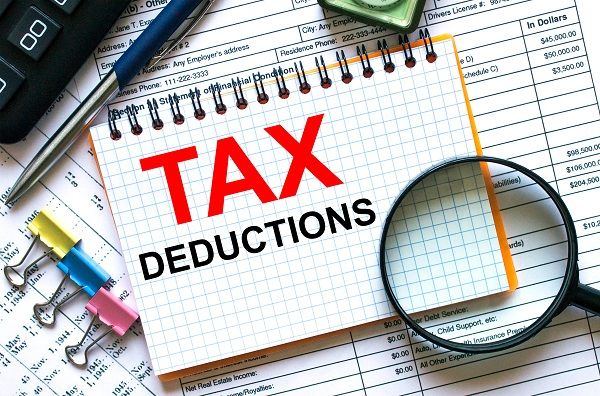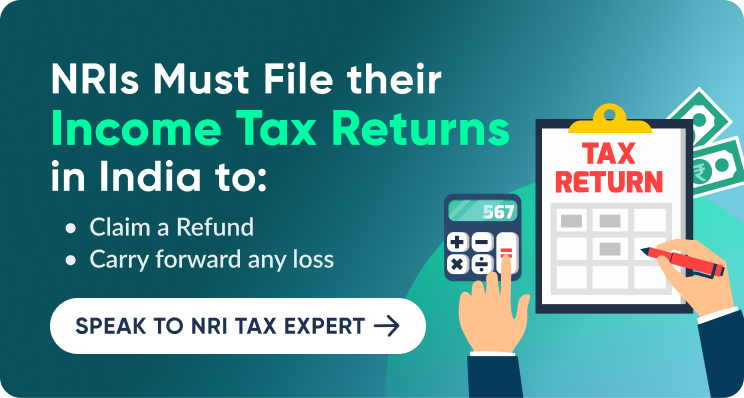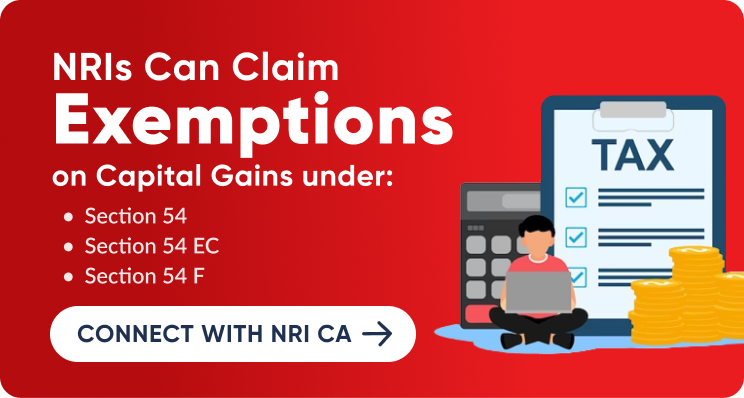We are all aware that the Indian economy is based on taxes paid by the citizens of India. NRI taxation under the The Indian Income Tax Act, 1961, applies to those people who make money outside of their place of residence. The income tax rules and benefits allowed to NRIs are different from those which the Indian residents are subjected to. In this article, we will discuss the NRI taxation system in India, details of their taxable incomes and if NRIs can avail of any tax deductions.

Who is an NRI?
According to the Income Tax Act, a citizen is said to be a resident of India if-
1. The status of Indian Resident is given to those who have stayed in India for about one eighty-two days during the financial year, or
2. Have stayed for a minimum of one year (365 days) in the last four years and stayed for sixty days in the concerned year.
Anyone not following the condition will be considered an NRI or a Non Resident Indian.
Do NRIs Have to Pay Taxes in India for Income Earned Abroad?
1. For non-resident Indians, only income earned, accumulated, or presumed to be earned in India is subject to taxation in India. If their income comes from any country other than India, then it is not subject to tax in India.
Sources of Incomes that are Taxable in India
India follows the “source rule” basis of taxation. This implies that all the income that accumulates from or through a source present in India is taxable in India. Given below is the list of such incomes:
1. Any salary received in India
2. Any salary received for services carried out in India
3. Rental income received from a property in India
4. Capital gain if there is any transfer of property or asset in India
5. Any income from deposits in India
6. Any interest received on savings bank accounts, etc.

Taxable Income of NRIs in India
Given below is a detailed account of taxable income of NRIs in India:
| Income From | Description |
| Salary | If you are an NRI and have received any salary in India directly into an Indian Account or it has been received on your behalf in India, then such salary income would become taxable in India. Therefore, if an NRI receives his or her salary for services in India, then that type of income is liable to be taxed. |
| House Property and House Loans | a. Any income from a house property in India (either vacant or rented) is taxable as per the prevailing rates.b. As per the income tax regulations, capital gains generated from the rent, sale or lease of a property in India. c. Like any other resident of India, an NRI can also claim a 30% deduction on his/her home loan in India. An NRI can also claim deduction for principal repayment, registration charges and stamp duty according to the Section 80C. d. It should also be noted that if a tenant pays rent to his owner who is an NRI, a TDS at the rate of 30% is required to be deducted before transferring the money into the account of the NRI. The person making the payment to the NRI is required to submit Form 15CA/15CB online to the Income tax department. |
| Capital Gains | a. Capital gains emerging from long or short term securities are taxable inIndiab. If there are shares held in India, then capital gains on them would also be taxable. c. Capital gains upon transfer of an asset in India is also taxable. |
| Other Sources | a. Indian sourced income in the form of interest on fixed deposits and saving accounts is taxable in India. Interest received on NRO (Non- Resident Ordinary) accounts is fully taxable whereas interest received on NRE( Non-Residential External) and FCNR (Foreign Currency Non Resident Account) is tax free. |
| Investments | a. NRIs are taxed at 20% if they invest in assets in India. They do not need to file returns if TDS has been deducted on the invested income.There are also some investment assets in India which qualify for special treatment. These are given below- 1. Central government securities2. Shares in Indian companies3. Deposits4. Debentures (for publicly listed companies) |

Can NRIs Avail of any Tax Deductions?
Most NRIs have this doubt, “Can NRIs avail of any tax deductions”? The simple answer is Yes. Similar to resident Indians, NRIs can also claim various deductions and exemptions from their income in India. Of the total deductions available to a resident individual, few are not available to NRIs. A brief list of deductions available or not to NRIs is shown below:
| Deductions Allowed | Deductions Not Allowed |
| 1 Section 80C: a. LIC premiumb. Tuition Fees c. Principal repayment of home loans d. ULIPe. ELSS | 1 Section 80C: a. Investment in PPF (Public Provident Fund). AN NRI cannot open a new PPF account, however, he/she can maintain the account which is already opened. b. Investment in NSC (National Saving Certificate) c. Post Office 5 Year Deposit Scheme d. Senior Citizen Savings Scheme |
| 2 Section 80D: Medical Insurance | 2 Section 80CCG: Under Section 80CCG, NRIs cannot avail tax deductions in investment in Rajiv Gandhi Equity Saving Scheme (RGESS) |
| 3 Section 80E: Interest Paid on Education Loan | 3 Section 80DD: Deduction for maintenance including medical treatment of dependent handicapped as defined under section. |
| 4 Section 80G: Payments made in the form of Donations. | 4 Section 80DDB: Deduction for medical treatment of dependent handicapped (as certified by a prescribed specialist) |
| 5 Section 80TTA: Interest on Savings Bank Account | 5 Section 80U: Deduction allowed to a taxpayer who himself suffers from disability. |
Explained: Deductions and Exemptions Available for NRIs
Given below are the deductions and exemptions on Non-Resident Indian Income Tax:
1. Under Section 80C, NRIs can avail these following exemptions-
a. Payment of tuition fees for children- NRIs can claim a deduction of tuition fees paid to any school, college or any universities situated in India for the purpose of full-time education of their children.
b. ULIPs (Unit Linked Insurance Plan)- Investment in ULIPs offers twin benefits of insurance and investment under a single integrated plan. Premium paid towards own, spouse and children is eligible for deduction.
c. Payment of premium for a life insurance policy- If the policy has been purchased in NRI’s name or in the name of his/her spouse or any child’s name, then deduction is available. The premium must be less than 10% of the sum assured.
d. ELSS (Equity Linked Tax Saving Scheme)- By investing in ELSS, you can claim a tax rebate of up to Rs 1,50,000 a year and save up to Rs 46,800 a year in taxes
e. Principal repayments on home loan- Like Indian residents, NRIs can also claim a deduction for principal repayment of house property loans. Other expenses incurred for the purposes of acquiring such property also qualify for deduction under the section.

2. Section 80D-
Under this particular section, NRIs can avail tax deduction on premium paid health insurance policy.
3. Section 80E-
NRIs can avail tax deduction on interest paid on education loan.
4. Section 80G-
Under this particular section, NRIs can avail tax deduction on all the payments made in the form of eligible donations.
5. Section 80TTA-
Up to Rs.10,000 can be claimed as deduction on interest income on savings bank accounts.
Exemptions and Deductions as per Union Budget 2023:
According to the Union Budget 2023, NRI taxpayers are eligible for several deductions and exemptions only if they select the Old Tax Regime. However, if they choose to opt for the New Tax Regime, they can’t claim any deductions, other than standard deduction.
Conclusion
To sum up, NRI taxpayers can avail several deductions and exemptions under different sections of The Indian Income Tax Act of 1961. But according to the Union Budget 2023, now the taxpayers can choose between the two regimes – New vs Old Tax Regime – when paying their taxes. So, if you are an NRI and want to claim deductions and exemptions, choose the Old Tax Regime as you cannot claim any deductions, other than standard deduction as per the New Tax Regime.
Contact SBNRI
For queries related to NRI tax deductions and exemptions, you can CONTACT US. You can also download the SBNRI App to connect with our NRI Tax / investment experts and get end-to-end assistance related to NRI tax filing. SBNRI will also help you get a lower TDS Certificate.
FAQs
If you are an NRI and your tax liability exceeds Rs 10,000 in a financial year, then you need to pay advance tax. In case you fail to pay the advance tax, you will have to pay an interest on the outstanding liability under Section 234B and Section 234C of the Income Tax Act.
Double taxation means when you are taxed twice on the same income in the country of residence and India. NRIs can avoid double taxation provided they leave one of the 90 countries with which India has signed DTAA (Double Tax Avoidance Agreement)



